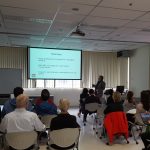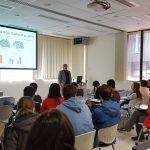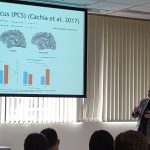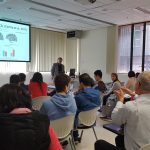Multilingualism and the Brain
Abstract
A majority of the global population is multilingual. Although studies have investigated the processes used to produce words in multilingual speakers, one criticism of this research is the emphasis on Indo-European languages including English as the dominant language. The question posed in this presentation is whether cognitive processes that have been assumed in all models of language processing (naming, reading and spelling) extend to multilingual speakers. This is not a trivial question. Multilingual speakers can use very different writing systems. Indeed, even within a language e.g. Japanese and Korean – two or more scripts must be learned to become literate (monolingual bi-scriptals). If the same cognitive mechanisms used to read, spell and write in one type of script have an impact on reading and spelling in different scripts then several clinical and pedagogical implications arise e.g. in diagnosis and treatment of aphasia, dyslexia and dysgraphia in multilingual speakers. One feature of the presentation will be cases of multilingual speakers who display reading and writing disorders in typologically different scripts. These cases highlight the many similarities across languages.
Speaker
Director of the Language, Science and Disorders Laboratory; Professor, Chair of Communication Science, HKU
About the Speaker
Weekes’s training was in experimental psychology (psycholinguistics) and neuropsychology at the University of Melbourne. His research interests then evolved into a specialisation in language disorders with a focus on aphasia and literacy (dyslexia). Weekes co-established the Sino-UK Laboratory for Communication Science in Beijing and continues his collaboration. His theoretical framework of multi-scriptalism in bilingual aphasia and language disorders in Chinese has motivated hundreds of publications and has become key reference. Weekes was the first in the world to conceptualise the effect of a multilingual environment on aphasia and literacy with implications for development of theoretical models of reading and writing and he was a pioneer in the use of brain imaging for the study of bi-scriptalism (Chee et al., 2000, 2001). In 2010, he established the Laboratory for Communication Science at HKU winning funding for a suite of new neuroscience technologies used for the first time in a Faculty of Education (EEG; Eye Tracking; fNIRS; MRI; TMS). Since the award of tenure in 2013 at HKU, Weekes has moved on to publishing research on aphasia and literacy in over twenty languages and was instrumental in founding the new Laboratory for Neuroscience in Education at HKU. His work is marked by a relatively high h index=31 for Education and also for a researcher in the fields of Experimental Psychology, Neuropsychology and SHS.
Date
26 February, 2018
Time
12:30-2:00pm
Location
Rm 205, Runme Shaw Building
Chair
Dr. Yuen Yi Lo
Presentation Slide
Presentation Slide 1 :






